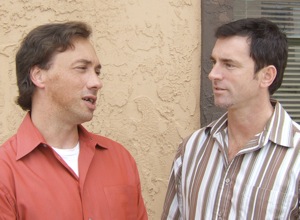-
- Bob Hattoy dies of heart attack at age 56
- Air Force captain sentenced to 50 years in prison for rape
- Romney criticizes McCain, Giuliani on immigration, gay rights
- Gay Episcopal bishop says American church should not sacrifice gays to keep ties to Anglicans
- Court: Law recognizes same-sex relationships similar to marriage
- City officials: Purported hate crime was faked
- National News Briefs
- World News Briefs
san diego
Center’s new program is ‘Changing the Dialogue’ in men’s community
Focus to extend beyond HIV and addiction services
Published Thursday, 08-Mar-2007 in issue 1002
There’s more to the gay, bisexual and trans-male (GBT) communities than AIDS, HIV and crystal meth.
While, for the last 25 years, the gay community has largely been defined in terms of these epidemics – the AIDS crisis, and, more recently, crystal meth addiction – gay men struggling with these issues comprise only a fraction of the GBT communities.
That’s why The Center, while remaining committed to HIV/AIDS and addiction services, has started a new program, “Changing the Dialogue,” to address the needs of the greater men’s community.
“Really for the past two decades, public health has dominated our lives and discussions about our community, and while that continues to be an important part of the community and an important issue for us to continue to talk about, it’s really an incomplete discussion, and it doesn’t take into account the richness of men’s lives,” said Patrick Loose, The Center’s director of programming and operations. “Nationally there has been a lot of attention paid to the male GBT community and trying to discover how we begin talking in the men’s community beyond the issues of HIV/AIDS and substance abuse and public health.”
The program, a collaboration with David Contois, co-founder of Knowcrystal.org, uses a form of problem solving known as Appreciative Inquiry (AI). Unlike the typical problem-solving business model, which starts from a negative – what’s wrong and how do we fix it? – AI starts by examining strengths, investigating wants and needs, and then examining possibilities.
“There has been a movement nationally in terms of how to conduct needs assessments,” Loose said. “One of the approaches is an ‘assets-based needs assessment,’ which is where instead of asking what’s wrong, you first ask what’s right, and you get a sense of the resources and talents and energies that are within a community first, before you begin talking about the problem. This allows you to be able to use those resources and strengths to address the problems.”
The first phase of Changing the Dialogue discovers the strengths, values and experiences of the community. This first phase is done via “community weavings.”
At a typical weaving, between eight and 12 men meet at someone’s home to discuss their feelings and experiences, and what they would like to see for the community.
“We’ve had 12 weavings so far,” Contois said.
At the weavings, participants talk about specific issues or experiences they’ve had, such as spirituality, work or partners. Contois explained that, as this happens, the participants begin to relate to each other based on shared experiences and ideals.
Loose said that for many of the participants, the weavings are a powerful experience because it isn’t often that people sit around and really listen to what’s important to each other and what others have to say or offer.
“The passion and despair and confusion that have come out of the AIDS crisis has fueled a conversation in the gay male community that is increasingly negative and is increasingly about ‘overcoming something,’” Contois said. “I just felt that we have so much to offer and I think that it’s important for us to talk about that amongst ourselves and share the experiences we have in our daily lives.”
The community weavings will continue up until and after the Changing the Dialogue’s Men’s Summit, which is scheduled to take place this fall at The Center. The many months of information gathering and community weavings will directly affect the Men’s Summit. Changing the Dialogue hopes to bring together more than a hundred men who’ve been to the community weavings, and come to consensus about men’s programming.
“We’re always looking for more weaving participants and people can certainly contact me if they’re interested in participating, or if they’re interested in hosting one,” Loose said.
At the summit, which will be a daylong event, participants will learn about the Appreciative Inquiry process of problem solving and put it into practice.
The Center hopes to come to some form of consensus about the needs of GBT men and what sort of programs The Center – or other organizations – need to implement to address the needs of GBT males beyond those of HIV and addiction.
The goal is to address a portion of the community which feels that there are no services targeted toward them, but The Center doesn’t intend to ignore longtime successful programs. “It doesn’t mean to ignore that there are very real problems in our community,” Loose explained. “HIV transmission and substance abuse are very real problems in our community, but there is much more to men’s lives than just those two issues.”
|
|
Copyright © 2003-2025 Uptown Publications


